Kingdom Come: Deliverance
Developer: Warhorse Studios
Publisher: Deep Silver
Platforms: PC, PS4, XB1
Price: $60
Copy Obtained By Reviewer
2/13/2018
The story of Kingdom Come: Deliverance starts innocently enough, mirroring many tales of medieval tragedy that have come before. Since its humble beginnings on kickstarter however, the game takes a sharp turn, forcing players on a humbling tale of growth, grit and political intrigue through a realistic lens. There are no dragons or mythical beasts in this medieval game; the only monster you’ll face on this adventure is man.
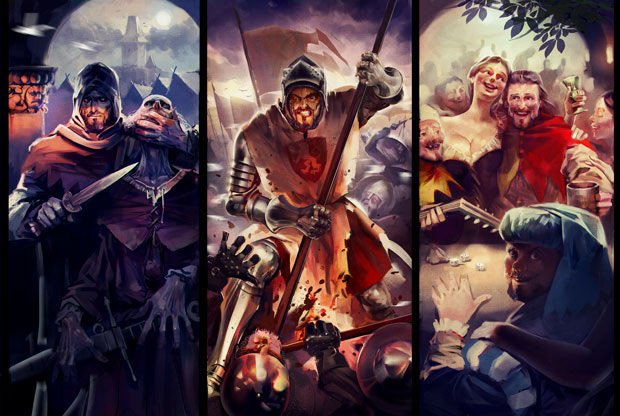
Becoming the desperate knight you've always wanted to be.
The game has been out for a year now, so it might be strange why we are choosing to cover it. In the end, the reason's simple: there's a game world here that's worth playing. With the third DLC expansion coming out tomorrow, Band of Bastards, it's a perfect time to explain why Kingdom Come is worth your time even now.
A Bohemian Rhapsody
This historical fiction begins with your character, a blacksmith’s son named Henry (or Hal for short), waking up from a hangover. You’re badgered by your mother about your whereabouts the last night, run some errands for your dad, throw some poop at the house of someone speaking ill of your king... y’know, normal teenage stuff. This peaceful morning is quickly interrupted however by the sound of war horns, and what starts as a bright story turns bleak very quickly.
I won’t spoil much else, because the path that you take with Henry from a lowly peasant to a knight of the realm is long and unforgiving, filled with its own twists and turns. The amazing thing is that this story is never impossible to believe. It takes place in the 1400s in the Kingdom of Bohemia (today's Czech-Republic); King Charles IV, King of Bohemia and Holy Roman Emperor, had passed and left the crown to his son, Wenceslas IV. He was more commonly known as Wenceslas the Idle, and due to inaction in his reign, tensions between lords quickly brewed. It’s these tensions that Henry is flung betwixt, and that you guide him through. Oh, and don’t worry about having to read a history textbook before playing: the game opens with a cutscene explaining all of this every time you launch it.
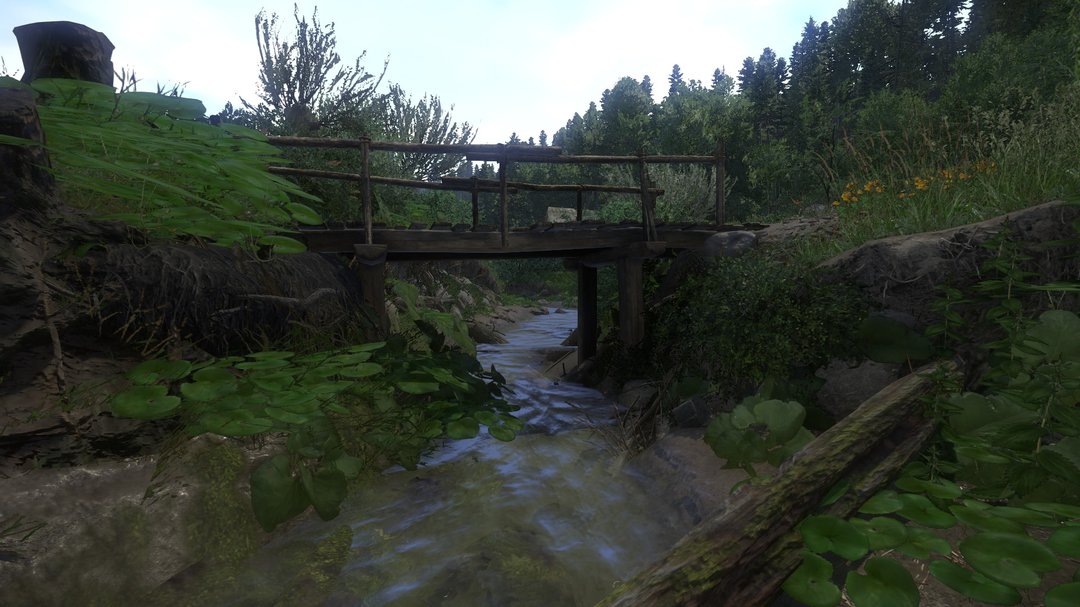
Kingdom Come: Deliverance progresses slowly, due in part to its realistic gameplay mechanics but mainly because of the extremely long quest lines of the game. You may be asked by your lord to investigate fake money being brought into the kingdom, so he sends you to the last place where it was spent. Then you have to interrogate the merchant who came into contact with whoever had the fake cash. You get where this is going. Nothing in the world of Kingdom Come is simple; every situation has multiple moving parts, and even something as simple as looking into a botched robbery at a farm can turn into a four hour long questline.
That isn’t to say that it isn’t satisfactory to gallop through the trials and tribulations in this story. Working through a web of intrigue to find where all the pieces fit, where every person involved in a scheme was involved can sometimes feel like work. Don't worry though, because this is the kind of work where you don’t really care how much you get paid because it’s just so damn fun. It’s not always all gloom and doom either; in fact, some of the side quests are just flat out silly, like my personal favorite where you get blackout drunk with a town’s priest and then have to give a magnificent sermon to the congregation in his stead. All with a massive hangover. Y’know, regular medieval stuff.
To Arms!
Kingdom Come: Deliverance offers up an experience with depth and so many options it’s staggering, although we have to point out some things seem to have been looked over. There are some bugs I ran into, and some of the menus feel clunky, as some examples.
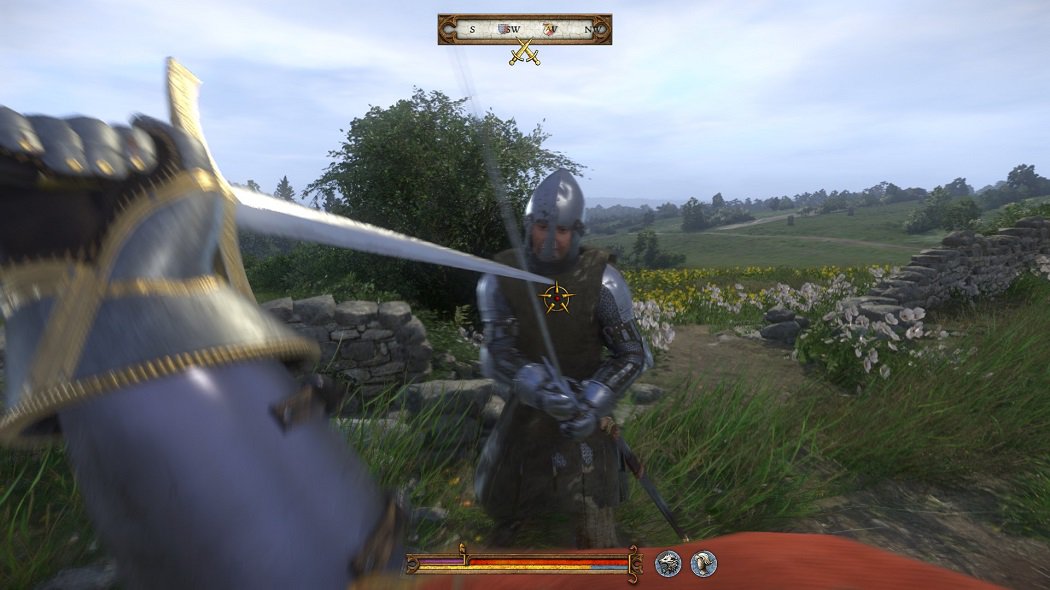
Knowing where your foe will strike next becomes a skill you have to master.
However, this game shines its brightest in it's combat, especially if you are heavily armored. Fighting feels different than a standard action RPG. It's more like a war of attrition with a little bit of chess thrown in. You need to be mindful of every attack you dole out or defend against so you don’t run out of stamina. Care has to be given when deciding which angle to swing at your enemy from. You need to keep your eye out for an opening, because just one can give you the space to use an advanced technique that can spell the end of even the most seasoned knight.
As much as you might want to get straight into adrenaline pumping combat against strong knights right away, it’s not the best idea. Henry is an untrained lad, and you have to guide him through the steps of becoming a master swordsman, or perhaps a maceman might be a better term? Either way, you’ll have to figure out what weapon suits you best first. A swortsword made perfect for stabbing and chipping away at the health of your opponents, while a morningstar works if you want to turn the knight in front of you into a tin can. The best way to get better with your weapon of choice is to just use it and gain experience in that weapon type. Eventually you’ll level up and become more proficient with your instrument, and you’ll be able to unlock advanced techniques.
For some reason however, your skill with a bow was looked over in this regard. There aren’t any perks even though you can level up your ranged ability, which kept begging the question from me: why? When there are perks for making you better at things like lockpicking and drinking, it felt like the ranger’s choice of weapon wasn’t given the same attention. I ended up not using my bow and arrow for anything other than hunting for that reason.
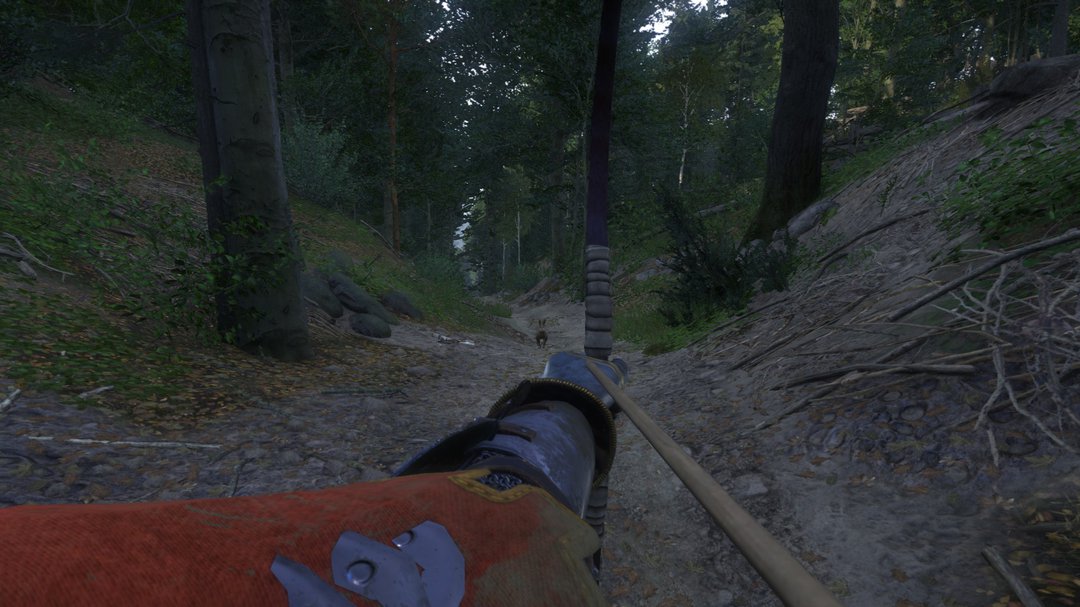
I still enjoy hunting with the bow, but its a shame that I can't really do more.
Weapons are just a small part of the enormous skill system in Kingdom Come that encompasses nearly everything you can do. Much like skills in The Elder Scrolls games, you get better at most things just by doing them, ranging from lockpicking to using a bow and arrow, to drinking. Every few levels you gain in a skill earns you a perk that somehow makes that ability better for you. For example, my favorite perk so far makes picking locks easier while Henry’s drunk, but also makes it a little bit louder and easier for others to notice. This system certainly isn’t revolutionary but it leads to some great ways to build a unique character, or rather, a unique Henry.
The Devil’s In The Details
In keeping with its realistic theme, you’ll also have to be mindful of Henry and how he’s doing. Over the course of the day he’ll get hungry and need nourishment, get tired and need sleep and get really dirty so that he needs a bath. Keeping food and drink on you during your travels is just as important as stopping at an inn for the night and getting a good night’s rest. When I spent time in towns, I ended up developing pretty healthy cycle of waking up early, eating breakfast and then heading into town for some shopping and to do quests. Although the need to sleep somewhere may seem or feel restricting in an open world game at first, I found that it added an extra layer of immersion and helped me form a deeper connection with Henry. I was worried about getting him enough food and sleep rather than annoyed, and ended up with a deeper connection to him for it.
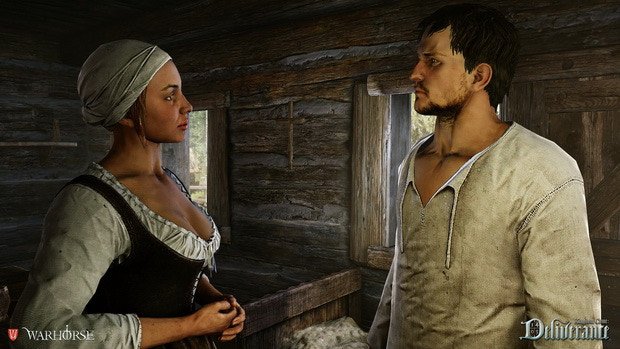
What’s most incredible about this medieval RPG is its seemingly equal attention to every aspect of gameplay. Nothing feels as if its been given more or less attention to it, although some things shine brighter than the rest. Stealth is reliant on numerous factors derived from your stats and equipment, potion-brewing is a lengthy process that feels like the closest thing to magic in the game. Even repairing weapons on a grindstone, sliding a sword across the spinning wheel while sparks shoot out in indication that your blade is becoming finer, is a treat
This same attention to detail is applied to the world that you travel through. While much of the open world is either dense forest or empty plains, there are plenty of points of interest scattered around in the forms of camps, farms or landmarks. They’re small additions to the admittedly atmospheric Kingdom of Bohemia that remind you, even in the most remote areas, that life is still around you. This reminder is necessary, especially given the enormous size of the map. Travelling on foot is almost never a good option if you’re going from town to town, as you’re likely to spend a good fifteen minutes getting to your destination. Unlike other similar RPGs, fast travel isn’t an easy alternative to regular travel. While you fast travel, you come across random encounters on the road, sometimes a carcass on the road or an ambush of bandits. You can either stop and investigate in these cases or chance an escape, but either way the fast travel doesn’t cheapen the experience offered. In cities, you get a real taste for the historical accuracy the developers at warhorse studios were shooting for. Every character has a routine for their day, from the people who haul water up from the river to the nobility starting their day with daily prayers.
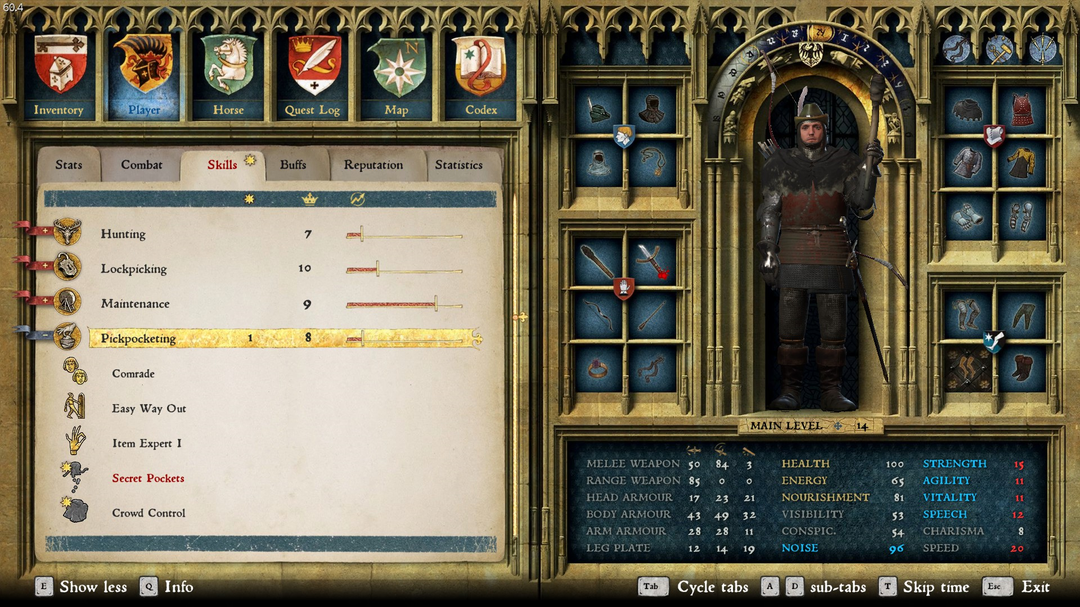
Choose your skills to become the sort of knight you wish: cutthroat, valorous, or somewhere in between.
Immersiveness doesn’t just happen with fantastic graphics or voice acting (although the game has both in spades), it comes from a world being able to answer every question that a person may have about it. Where does this person work, where do they sleep, where do they get their food? The world of Kingdom Come has an answer to anything you may ask of it because it is fully developed, there isn’t any room to question what it is or how it works. Every cultural peculiarity or fact of life at this time in history is explained, even in vigorous detail if you want to go through its extensive codex. In fact, this small subsection of your menu might be where you can see most clearly the love for history that members of Warhorse have.
No Happily Ever After, And I'm Fine With That
I’ve only managed to make it fifty hours into Kingdom Come: Deliverance, and while I’m sure that the end of this tale is far away, I know there won’t be any fairy tale ending. The story told in this game isn’t a romanticization; it’s a tale soaked in blood and the loss of innocence. It’s the story of a boy forced to grow up in a world after learning of its brutal nature. It takes its players on a long walk down forest paths, battlefields and castle courts, drowning you in historical accuracy and detail.
This is not a game for someone that wants to have a power fantasy. This is not a game for someone that wants to have an easy answer to the problems of day to day life. This is a game about immersion, about how life used to be, and how people struggle through hardship, for better or for worse. I don’t know how much longer it’ll take me to finish that walk, but I hope it isn’t any time soon.